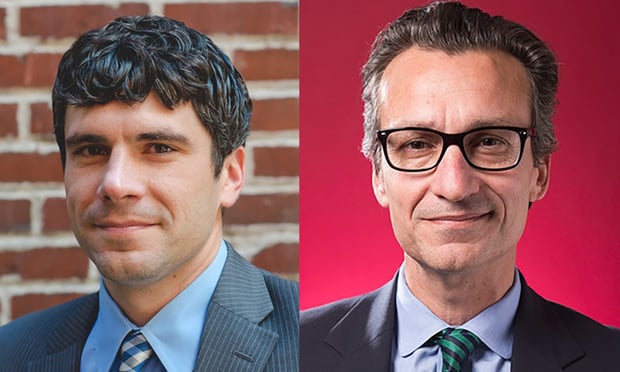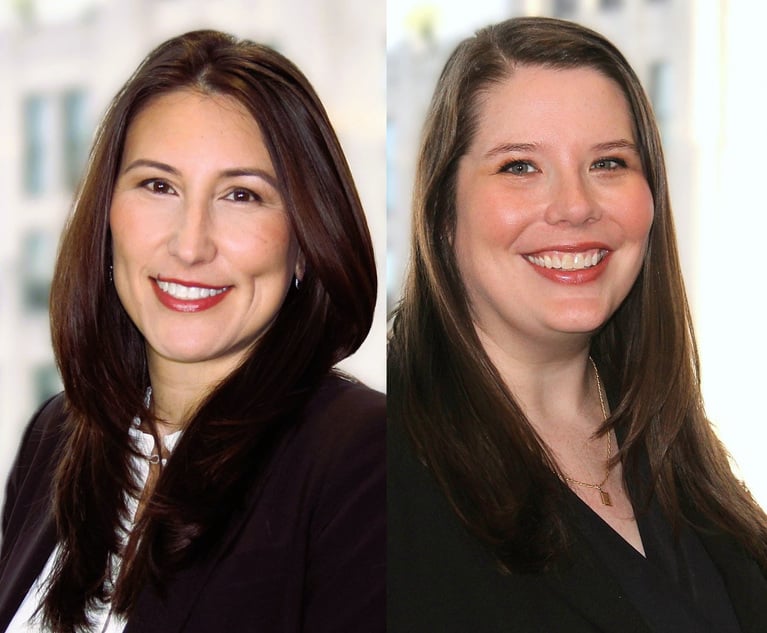 Mark Loudon-Brown, senior attorney with the Southern Center for Human Rights (left) and Chris Fabricant of the Innocence Project. (Courtesy photos)
Mark Loudon-Brown, senior attorney with the Southern Center for Human Rights (left) and Chris Fabricant of the Innocence Project. (Courtesy photos) Georgia Can Do Better Than Offer Uniquely Unequal Expert Evidence Standards
"A civil defendant's money is protected against unreliable science, but a criminal defendant's life is not."
January 27, 2021 at 01:03 PM
6 minute read
In 1982, the Supreme Court of Georgia held, in Harper v. State, that in deciding whether to admit expert scientific evidence, a trial court should ask whether "the procedure or technique in question has reached a scientific stage of verifiable certainty." This was the law in both civil and criminal courts for the next 23 years, until 2005. With the support of a tort-reform lobby seeking to shield businesses from liability claims rooted in suspect "scientific" evidence, the Legislature passed O.C.G.A. § 24-7-702. This statute essentially incorporated the federal Daubert standard of admissibility, requiring that scientific evidence be based on reliable scientific methods and that such methods be reliably applied in the given case. Reliability thus became the touchstone for the admission of science into civil court.
In criminal court, however, "[p]rosecutors opposed any adoption of Daubert in criminal cases and lawmakers responded by limiting" § 702 to civil cases. Paul S. Milich, Georgia's New Evidence Code—An Overview, 28 Ga. St. U. L. Rev. 379, 409 (2012). Pursuant to § 24-7-707, in criminal court "the opinions of experts on any question of science, skill, trade, or like questions shall always be admissible." Where a person's life is at stake, unreliable "scientific" evidence was and shall always be admissible; where money is the issue, however, the evidence must be proved to be reliably scientific. Georgia can do better.
This content has been archived. It is available through our partners, LexisNexis® and Bloomberg Law.
To view this content, please continue to their sites.
Not a Lexis Subscriber?
Subscribe Now
Not a Bloomberg Law Subscriber?
Subscribe Now
NOT FOR REPRINT
© 2025 ALM Global, LLC, All Rights Reserved. Request academic re-use from www.copyright.com. All other uses, submit a request to [email protected]. For more information visit Asset & Logo Licensing.
You Might Like
View All

CFPB Proposes Rule to Regulate Data Brokers Selling Sensitive Information
5 minute read
Trending Stories
- 1Justice Department Sues to Block $14 Billion Juniper Buyout by Hewlett Packard Enterprise
- 2A Texas Lawyer Just Rose to the Trump Administration
- 3Hogan Lovells Hires White & Case Corporate and Finance Team in Italy
- 4New York District Attorneys Endorse Governor's Proposed Rollback of Discovery Reforms
- 5Greenberg Traurig Launches Munich Office with Eight Hires, Including McDermott Group
Who Got The Work
J. Brugh Lower of Gibbons has entered an appearance for industrial equipment supplier Devco Corporation in a pending trademark infringement lawsuit. The suit, accusing the defendant of selling knock-off Graco products, was filed Dec. 18 in New Jersey District Court by Rivkin Radler on behalf of Graco Inc. and Graco Minnesota. The case, assigned to U.S. District Judge Zahid N. Quraishi, is 3:24-cv-11294, Graco Inc. et al v. Devco Corporation.
Who Got The Work
Rebecca Maller-Stein and Kent A. Yalowitz of Arnold & Porter Kaye Scholer have entered their appearances for Hanaco Venture Capital and its executives, Lior Prosor and David Frankel, in a pending securities lawsuit. The action, filed on Dec. 24 in New York Southern District Court by Zell, Aron & Co. on behalf of Goldeneye Advisors, accuses the defendants of negligently and fraudulently managing the plaintiff's $1 million investment. The case, assigned to U.S. District Judge Vernon S. Broderick, is 1:24-cv-09918, Goldeneye Advisors, LLC v. Hanaco Venture Capital, Ltd. et al.
Who Got The Work
Attorneys from A&O Shearman has stepped in as defense counsel for Toronto-Dominion Bank and other defendants in a pending securities class action. The suit, filed Dec. 11 in New York Southern District Court by Bleichmar Fonti & Auld, accuses the defendants of concealing the bank's 'pervasive' deficiencies in regards to its compliance with the Bank Secrecy Act and the quality of its anti-money laundering controls. The case, assigned to U.S. District Judge Arun Subramanian, is 1:24-cv-09445, Gonzalez v. The Toronto-Dominion Bank et al.
Who Got The Work
Crown Castle International, a Pennsylvania company providing shared communications infrastructure, has turned to Luke D. Wolf of Gordon Rees Scully Mansukhani to fend off a pending breach-of-contract lawsuit. The court action, filed Nov. 25 in Michigan Eastern District Court by Hooper Hathaway PC on behalf of The Town Residences LLC, accuses Crown Castle of failing to transfer approximately $30,000 in utility payments from T-Mobile in breach of a roof-top lease and assignment agreement. The case, assigned to U.S. District Judge Susan K. Declercq, is 2:24-cv-13131, The Town Residences LLC v. T-Mobile US, Inc. et al.
Who Got The Work
Wilfred P. Coronato and Daniel M. Schwartz of McCarter & English have stepped in as defense counsel to Electrolux Home Products Inc. in a pending product liability lawsuit. The court action, filed Nov. 26 in New York Eastern District Court by Poulos Lopiccolo PC and Nagel Rice LLP on behalf of David Stern, alleges that the defendant's refrigerators’ drawers and shelving repeatedly break and fall apart within months after purchase. The case, assigned to U.S. District Judge Joan M. Azrack, is 2:24-cv-08204, Stern v. Electrolux Home Products, Inc.
Featured Firms
Law Offices of Gary Martin Hays & Associates, P.C.
(470) 294-1674
Law Offices of Mark E. Salomone
(857) 444-6468
Smith & Hassler
(713) 739-1250







